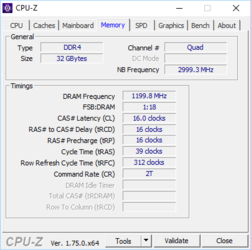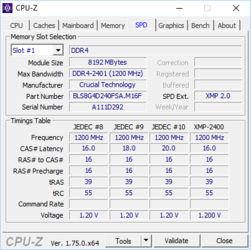- Joined
- Aug 14, 2014
I've always read that AMD CPU's were incredibly weak and now I believe it.
Welcome to Overclockers Forums! Join us to reply in threads, receive reduced ads, and to customize your site experience!
I've always read that AMD CPU's were incredibly weak and now I believe it.
Exactly my point, there isn't a game nowadays that wouldn't run on a fast 4 core given a few programming tweaks (and a few programming lessons to the actual programmers). OFC it might change eventually as games get more photo-realistic, but personally i don't see it happening soon. You might want/need more if for example you're gaming and streaming or gaming and folding or have several monitors and always multitask.
Tried out Shadows of Mordor said to be one of the most demanding games to date, disabled HT and ran the benchmark on 1920x1080 Ultra settings with the HD addon, max 201 average 146 min 106, re-enabled HT and got around ~10 fps faster on all counts. I think i have room to wiggle if i need to multitask
- Bit outdated but workable ?

So, nothing changes. It will be a couple of years before DX12 titles start to saturate the market.
It depends. In the case of X-Com a quad core with no hyper threading might struggle during moves. After monitoring the processor usage it explains the performance complaints on steam. This is probably the most CPU intensive game I have seen.
Most of the games I have run just fine on four or less cores. For these games the fastest quad core with the best graphics chips would be best. That said with games starting to come out that use 5 or more cores a quad i5 with no hyper threading will start to struggle to keep up compared to a processor that can operate more cores at once.
A well programmed game won't make a game magically work better when the processor doesn't have enough cores. Hyper Threading would help a little bit but is no substitute to actual real cores. I think we are looking at the start of the hex era.
Nighthawk I just wanted to say I'm amazed at the speeds you've realized w/your memory on your i7-5930:
CPU: Core i7-5930K @ 4.7GHz Cooled By: Corsair H100i GTX
Motherboard: MSI X99A SLI Plus
RAM: Crucial Ballistix Sport DDR4-2400 32GB Quad-Channel Memory Kit @ 4800MHz (1199.2 MHz per channel)
That's faster than the memory on my old ATI 4870 and approaching the stock memory speed of my ATI (or was it AMD by then?) 6950.
What kind of latency and bandwidth do you get at those insanely high memory speeds? What kind of uncore and memory voltages did it require to get there?


That isn't how it works. Your Memory is running at ~1200Mhz. Because it is DDR (Double Data Rate) it is 2400MHz effective. Adding up the number of channels does not yield another jump and equal more 'effective' MHz. Channels have nothing to do with the MHz it is running be it actual or 'effective'.It's actually the stock speed of the RAM. I haven't tried pushing the RAM any faster because it just feels so fast already. The memory is advertised as 2400 but really it is 1200 MHz per channel. Since the X99 board supports quad channel memory the budget gaming memory kit screams at ~4800MHz. It's a perk of having a X board over a mainstream Z board.
That isn't how it works. Your Memory is running at ~1200Mhz. Because it is DDR (Double Data Rate) it is 2400MHz effective. Adding up the number of channels does not yield another jump and equal more 'effective' MHz. Channels have nothing to do with the MHz it is running be it actual or 'effective'.
Yes, you do get a lot more bandwidth, but very few things can utilize it. Quad channel compared to dual yields negligible increases in most most cases (was tested back in X79 days and X99 again).
No.Isn't it channel speed multiplied by the number of channels?
Because CPUz is not saying each stick is operating at ~1200Mhz. That is the speed ALL sticks are operating at. You do not 'add up' the speed of the sticks in each channel for an effective rate.
They are running at 1200Mhz actual, with a DDR4 rate of 2400MHz. It's effective/DDR4 rate is the same in Single/Dual/Triple/Quad channel.
nope.. that's still ddr.I always thought the DDR was made to run in groups. Back in the days of 533MHz FSB two channels of 266MHz DDR where used to get the RAM up to 533MHz speeds to match up with the processor when in dual channel configuration.
It's rather confusing then to say that 1200MHz in Quad Channel isn't 4800MHz. I guess maybe I used the wrong term. Maybe FSB?
Your memory works in parallel so it is a even storage in the memory banks, some what similar RAID 0. The speed of the memory is how fast it is reads and writes to the CPU on the busses..